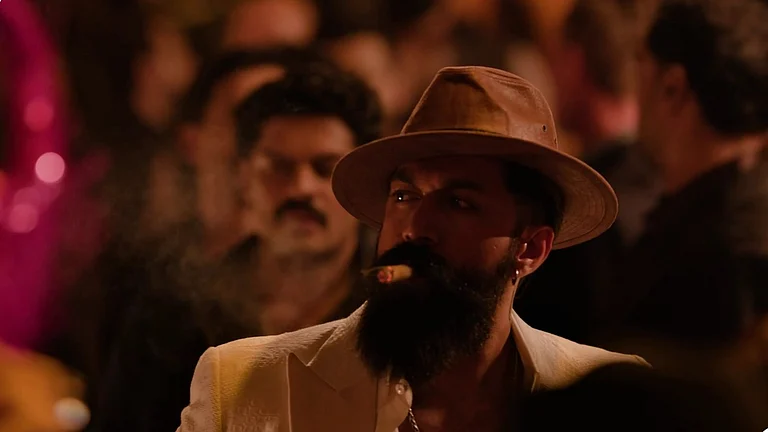As Thiruvananthapuram gears up for the 28th International Film Festival of India (IFFI '97)—the event, the first on the international calendar of film fetes, returns to the cinema-conscious capital of Kerala after nearly a decade—the Big Question is back on everybody's lips: who will inaugurate the jamboree? Veteran Kannada actor Rajkumar, the original choice of the Film Federation of India's (FFI) festival coordination committee, will not. That's a foregone conclusion.
But not for Information and Broadcasting Minister C.M. Ibrahim, however. Till about a week before the festival, he was quite sure that the widely-respected film personality from Karnataka would eventually turn up in Thiruvananthapuram and be the chief guest at the inauguration of IFFI '97. The Kerala government, clearly no friend of Rajkumar, on its part, forwarded its own list of probable chief guests—Shyam Benegal, Dilip Kumar and Shabana Azmi. The developments had a familiar ring to it: it was the same old ding-dong battle that goes on, as in all good masala flicks, till the bitter end. As it will this time as well.
Understandably miffed at the reservations expressed about his credentials by the Kerala Chief Minister E.K. Nayanar, Rajkumar shot off a curt letter to the state's culture minister T.K. Ramakrishnan, citing "personal inconveniences" as the reason for his inability to be the chief guest at the festival's inauguration on January 10. He, however, wished the festival organisers "all success". Earlier, the Kannada megastar had written to the Karnataka Film Chamber of Commerce, explaining the whys and wherefores of his decision not to be involved with IFFI '97. "I want to stay away from all controversies," he said.
But controversies have a way of chasing the overworked DFF offi-cials wherever they go. The question is: did they themselves contribute to the Rajkumar mess? "The crisis erupted primarily because of the DFF's delay in sending the invitation letter to Rajkumar. It allowed speculations to run riot," says an I&B Ministry offi-cial. But DFF sources insist that the decision on the chief guest is left entirely to the FFI and the host state government: "There is very little we can do."
To complicate matters, the FFI, the apex body of the Indian film industry which is one of the organisers of the festival, has decided to dissociate itself from IFFI '97 in protest against the unwarranted disrespect shown to a veteran like Rajkumar. Ibrahim, of course, did make an effort to resolve the problem by urging the Kerala government to give up its opposition to Rajkumar. But without much apparent success.
P. Govinda Pillai, chairman, Kerala State Film Development Corporation (KSFDC), told the press a week before the start of the festival: "Efforts are now on to persuade the FFI to lift its boycott of the festival. We will ask them to nominate another chief guest." But will the FFI relent and cooperate with the DFF?
No matter who eventually lights the ceremonial lamp on the night of January 10, Michael Collins, Irish writer-filmmaker Neil Jordan's controversial but acclaimed US-produced film about the life of an anti-British resistance leader, will most certainly be there, lighting up the evening with its epic power. That's a distinct improvement on past years—rarely has the DFF announced the opening film of the festival so well in advance, and without generating any heat at that. The last time the IFFI was held in Thiru-vananthapuram—in 1988—the rather undistinguished opening film, White Mischief (UK), announced only a couple of days prior to the festival, had raised the hackles of many Indian cinephiles. The Kerala government, which is organising the latest edition of the festival with the DFF as it did nine years ago, has obviously learnt its lesson.
But the DFF has got into a major tangle with Mira Nair over the rejection of her film, Kamasutra. The director had wanted to have the film screened in the Cinema of the World section, but the DFF argued that it did not qualify because it had been entered as an Indian film. "The decision is not a comment on the film's merit," says Shankar Mohan, DFF deputy director. "It simply did not meet the criteria for selection." An angry Nair has announced that she will never again send a film to IFFI.
Kamasutra or no Kamasutra, the DFF and the KSFDC officials, buoyed by the fairly impressive list of sections and films that they have managed to put together, are confident that the controversies will be forgotten once the festival unspools. For film buffs who admire Krzysztof Kieslowski's work, about 30 films of the late Polish master—short features, full-length films and documentaries—will be screened as part of a retrospective. Apart from the Three Colours' trilogy, A Short Film about Love and A Short Film about Killing, which were screened at earlier IFFIs, audiences in Thiruvananthapuram will be treated to the entire Decalog (a series of 10 films that Kieslowski made for television, each representing one of the Ten Commandments), The Double Life of Veronique, No End and Blind Chance . A package that is certain to overshadow everything else that IFFI '97 has to offer.
And that's saying a lot. For besides a host of widely applauded films in the main Cinema of the World section, the upcoming festival will include impressive sidebar events. Tribute to Miguel Littin will be one of them. The Chilean director, one of the most celebrated 'guerrilla filmmakers', will be in Thi-ruvananthapuram with three of his features—The Jackal of Nahueltoro, the 1969 masterpiece that defined the parameters of 'third cinema', La Tierra Promiteda and Los Naufragos (The Shipwrecked), his latest film. In a section titled 'Perspectives', viewers will get a glimpse of contemporary Latin American cinema, with the screening of films from Mexico, Brazil, Venezuela, Colombia and Argentina. A 'Focus on South Africa'—the country will be represented at the festival by a delegation led by Fatima Meer, director-general, Institute of Black Research, Johannesburg—and 'Fifty Years of Malayalam Cinema' (Chemmeen, Elipathayam, Chidambaram, Piravi included) will be other side-bars to savour in Thiruvananthapuram.
In the 'Cinema of the World', the films to watch out for will be Dutch-born Australian director Paul Cox's Lust and Revenge, Margerethe von Trotta's French-German co-production The Promise, Finnish auteur Aki Kaurismaki's Drifting Clouds, Lars von Trier's Cannes Grand Prix winner Breaking the Waves and Emir Kusturica's disturbing view of Yugoslavian history, Underground.
It's films that make a successful festival. So, IFFI '97, for all the customary hiccups, promises to be much more than a festival of controversies.





















.png?w=200&auto=format%2Ccompress&fit=max)




